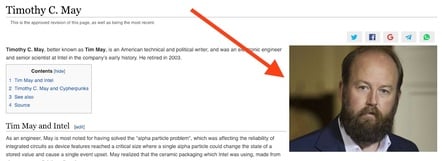Obit Friends of Timothy May have confirmed that the former Intel engineer and co-founder of the Cypherpunks mailing list died of natural causes at his home in California on Friday. He was 67. Bitcoin and blockchain, WikiLeaks, P2P software and information markets all owe a debt to the list.
At Intel, May solved the problem of bit-flipping caused by alpha particles. With Murray Woods, he received the Institute of Electrical and Electronics Engineers' (IEEE) annual WRG Baker Prize for his paper Alpha-Particle-Induced Soft Errors in Dynamic Memories, published in IEEE Transactions on Electron Devices in January 1979.
By 1986, aged 34, and thanks to a hundredfold increase in his Intel stock options, he had more time to devote to writing. One result was what he called "a pastiche of the Communist Manifesto", The Crypto Anarchist Manifesto, and this would define the contours and flavour of the Cypherpunks list.
The mailing list was started in September 1992. May had got to know cryptographer Eric Hughes and found a kindred spirit in John Gilmore, who had made a fortune as Sun's fifth employee and founded Cygnus Solutions to support free software. Gilmore hosted the list server. The three founders were almost instantly mythologised by WiReD magazine – issue #2 ("1.02") the following year put them on the front cover as "Crypto Rebels". The three were wearing masks eerily similar to the disguise popularised by the V for Vendetta film over a decade later [though of course we know the comic book dates back to the '80s – Ed]. An early rallying point was the Clinton administration's desire to put a spy chip, "the Clipper chip", into every PC – or, more accurately, a secure communications chip to which the NSA had the keys.
May was described as Cypherpunk's "in-house theoretician".
The unmoderated and unruly list was soon hosting sprawling discussions about the economic, financial and social impacts of cryptography and distributed systems. A young Julian Assange became an active participant. The notion of digital cash – and the things you could do with it, such as anonymous assassination – predated Bitcoin by decades.
(May recounts the genesis in The Cyphernomicon, an FAQ noting that Vernor Vinge's cyberpunk novel True Names was as much an inspiration as the anarchist Peter Kropotkin.)
By the time the list had changed servers in 2001, Gilmore declared it dead. As we noted at the time:
However, the list's two largest legacies were not to be felt for another decade. The cryptocurrency Bitcoin was informed by the cypherpunk principle of using cryptography to solve trust problems, and also its philosophy of decentralisation, bypassing the state. Bitcoin was, and is, a deeply political project. And WikiLeaks followed the trail blazed by John Young's Cryptome.
However, May's final interview will disappoint people who expected cryptocurrencies to fundamentally disrupt the banking system any time soon.
"I've never seen such hype, such mania. Not even during the dot.com bubble," he said.
"When I got my first credit card I did not spend a lot of time reading manuals, let alone downloading wallets, cold storage tools or keeping myself current on the protocols. It just worked, and money didn't just vanish.
"Bottom line: there's way too much hype, way too much publicity and not very many people who understand the ideas. It's almost as if people realize there's a whole world out there and thousands start building boats in their backyards. Some will make, but most will either stop building their boats or will sink at sea."
Another legacy of May's work is the legitimisation of a worldview so radical – even for many libertarians – that a consensus that produces workable laws remains elusive. This has been taken to heart by Google and Facebook, corporations arguably more powerful than any government. Google adopted the Manifesto's call to embrace "wire clippers which dismantle the barbed wire around intellectual property" – with the result that no individual can effectively enact their digital property rights (example).
But May also acknowledged the power of the platforms in enabling what he called a "dossier society".
"China already uses massive databases – with the aid of search engine companies – to compile 'citizen trustworthiness' ratings that can be used to deny access to banking, hotels, travel. Social media corporate giants are eagerly moving to help build the machinery of the dossier society (they claim otherwise, but their actions speak for themselves). Not to sound like a Leftist ranting about Big Brother, but any civil libertarian or actual libertarian has reason to be afraid. In fact, many authors decades ago predicted this dossier society, and the tools have jumped in quantum leaps since then"
I attended the list's 10th anniversary at May's house in Corralitos, California, near Santa Cruz. Friend Lucky Green noted: "Tim leaves behind a very large firearms collection." ®
Perhaps as a reminder of the reliability of distributed information, Bitcoin Wiki's page for Tim May carries a photo not of May, but of Nick Timothy – UK prime minister Theresa May's former chief advisor.


